No products in the cart.
Quarterly News Bulletin July – September 2016
Many new initiatives began during the quarter including partnerships with Indus Resource Center, BRAC and Azat Foundation. TRC continues to strengthen it’s ties with the Government of Punjab to further the ECE training agenda and is all set to undertake teachers and school heads’ training in Baluchistan under the Global Partnership for Education project in collaboration with the Balochistan Government.
TRC is proud to welcome government teachers in the ECE professional development programme. This was made possible through generous financial support by the corporate organisations and individuals. For the first time in five years, the programme will run both in English and Urdu with 34 teachers enrolled. We are all set to get our first international accreditation by CACHE, a UK based accreditation body. The international endorsement will enable the teachers to benefit if they chose to work outside Pakistan.
TRC Trending…
TRC is on Facebook! This is where we share ideas, tips and news with our online teaching community. It is a space to learn new ideas, share experiences and stay informed about all the latest happenings at TRC.
Projects at TRC
Grade 2 Math assessment for IRC-supported schools
From August 11th – 30th, 2016, TRC conducted a baseline survey of Grade 2 Math in 26 public and private/community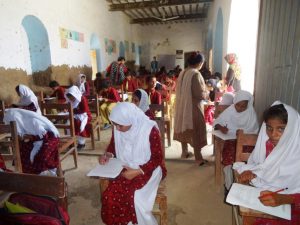 schools supported by Indus Resource Centre (IRC) in Karachi, Khairpur and Jamshoro. TRC developed an inception plan with a detailed methodology for execution and developed a comprehensive tool to assess and evaluate Grade 2 students’ curriculum based Math concepts in the selected schools.
schools supported by Indus Resource Centre (IRC) in Karachi, Khairpur and Jamshoro. TRC developed an inception plan with a detailed methodology for execution and developed a comprehensive tool to assess and evaluate Grade 2 students’ curriculum based Math concepts in the selected schools.
TRC developed the baseline tool in English and also translated it into Urdu and Sindhi. The tool was administered in 26 schools and more than 800 children of grade 2 participated in the study.
To evaluate students’ post-training learning outcomes in Math, TRC will conduct the end-line assessment of Grade 2 in the same 26 schools in February 2017.
ECE trainings for BRAC supported government teachers
Two training sessions were conducted for government primary school teachers in Hub, Balochistan Winder, Sakran, Someani and Dam with the support of BRAC Foundation. The trainings were carried out from 26th to 30th July, 2016 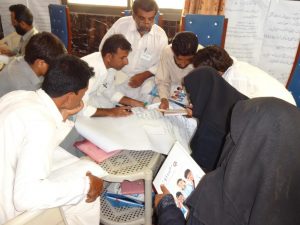 and were attended by 38 participants (male and female). A second series of full-day training sessions was conducted with 49 participants from 2nd to 6th August, 2016.
and were attended by 38 participants (male and female). A second series of full-day training sessions was conducted with 49 participants from 2nd to 6th August, 2016.
Each participant was a given a copy of “Mazboot Bunyadain” (Strong Foundations) and a set of the Critical Thinking lesson plans that TRC developed under its Thinking Classroom Project. The Science, Social Studies and Math lesson plans are aimed at classes from kindergarten to Grade 5 and some also target multi-grade classroom environments. The training was based on the principles of ECE that are integrated into the National Curriculum for Early Childhood Education (NC ECE) developed by TRC in collaboration with the Ministry of Education. The teachers participated enthusiastically in the sessions and showed great interest in further trainings.
TRC to undertake GPE/World Bank supported ECE trainings in Balochistan
The Government of Balochistan’s Secondary Education Department is implementing the Balochistan Education Project in collaboration with the Global Partnership for Education (GPE) and World Bank. TRC has been selected as the ECE consultant for designing and carrying out capacity building programmes for teachers and head teachers/education managers in the Province.
In this regard, TRC team was invited to attend the first project meeting in Quetta on 21st September 2016. Noshin Khan and Tabinda Jabeen represented TRC in the consultative session and finalized the scope of the project with the government officials.
TRC’s emerging role in Punjab for ECE strengthening
On 23rd September 2016, Noshin Khan Senior Manager ECE programme represented TRC at an event held by the Education Team at the World Bank, Islamabad Office, on Early Childhood Development. The event was organised to discuss possible opportunities and the potential pitfalls of the rapid expansion that is being undertaken by the Punjab Government to provide access to quality Early Childhood Education under the project, Early Learning Partnership (ELP). The ELP System Research Project was also launched at the event. The project aims to develop an evidence base which will guide policy makers on how to deliver early learning activities equitably, cost effectively with quality and at scale.
Technical input for ECE Resource Kit finalisation
Noshin Khan, Senior Manager ECE programme participated in the full day Consultative Session on 1st September 2016 at the Directorate of Staff Development (DSD) Punjab-Lahore. The session brought together a select group of ECE experts, developers / suppliers of ECE equipment and international partners to engage in discussions and productive exchanges aimed at analysing and reviewing the present ECE framework in Punjab’s public schools. Relevant learning resources/materials for ECE and ECE classrooms were reviewed extensively and recommendations on improving resource provisions for the classrooms were shared with DSD.
On 23rd September, 2016, Tabinda Jabeen represented TRC at a follow-up session to review and finalise the ECE Resource Kit for use in public sector schools throughout Punjab. TRC’s input and recommendations were well received by DSD.
Multi School Workshops
During the quarter, three workshops were organised titled ‘Promoting Writing Skills in Children’, ‘Role of a School Coordinator’ and ‘Sawalat Pochnay ki Salahiat’ which were attended by a total of 70 participants.
Guest Lecture Session
Mindfulness: Educating the Whole Child
TRC organised a talk session titled ‘Mindfulness: Educating the Whole Child’ on 24 September 2016. Being mindful is an idea—actually a way of being—whose time has come. It’s an approach that recognises and cultivates the best of who we are as human beings and is today an essential part of the National Curriculum of many countries as a component of the SPHE (Social Physical and Health Education) program. The simple act of being mindful has the power to change everything—how we approach ourselves, our challenges, our relationships, and our communities. Being mindful is part of the spirit of the times. Mindfulness is already having an impact in our schools, hospitals, offices, governments, and many other places. It’s helping us to become healthier, to lead more effectively, and to cooperate with each other in making a better world.
The guest speaker at the session was Mr. Shahpur Jamall, who is the co-founder, Academic Director and Principal of Bay View Academy, a leading private school located in Karachi, Pakistan, established in 1990. He also cofounded Southshore School for A-level Studies and serves on its board as a director. Mr. Jamall holds a Masters Degree in Education from the University of California at Los Angeles (UCLA) as well as a California Teaching Credential. He taught in the Los Angeles Unified School District before moving back to Pakistan 25 years ago.
During this two-hour, interactive session, the participants were kept involved in discussions to explore and gain an understanding of what Mindfulness is and why we spend so much of our time being ‘mindless’. They were shown videos that highlighted the experiences related by others. The speaker guided them through a series of concentration exercises during the session, to experience of what actually happens during meditation. This exercise created an environment of calm and serenity that made participants experience thoughts, sensations and emotions that helped to reduce stress without using any object. They acknowledged the power of mindfulness and received the message that came through this activity which was that one can totally change one’s inner environment as well as one’s perception and reactions to one’s outer environment. Towards the end, articles on professional development were read and discussed, which helped to further understand the approach of Mindfulness. They were able to see the link between Mindfulness and a better classroom environment and gained ideas to help students learn to pay attention and become better listeners.
School Focused Workshop
ECE workshop for Shahwilayat Public School teachers
Upon request from Shahwilayat Public School, TRC conducted the ‘Active Learning’ workshop at the school premises,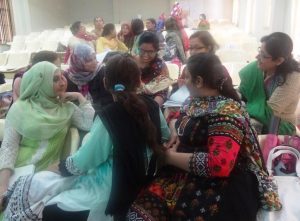 from 20th to 30th July, 2016. Noshin Khan and Tabinda Jabeen led the training sessions which were attended by 29 school teachers. The training extensively covered areas like child development, active learning, the learning environment, lesson planning, observation and assessments, and teacher’s role and responsibilities.
from 20th to 30th July, 2016. Noshin Khan and Tabinda Jabeen led the training sessions which were attended by 29 school teachers. The training extensively covered areas like child development, active learning, the learning environment, lesson planning, observation and assessments, and teacher’s role and responsibilities.
The ten-day workshop was rigorous and intensive. Participants were introduced to dominant and influential ECE theories and approaches and were also shown videos related to these theories to help them develop a better understanding. Through activities and interactive discussions the participants were able to differentiate between an activity and active learning. They were given the opportunity to reflect on their teaching practices to see how they could make their classrooms more conducive and child friendly.
The teachers worked in pairs and developed lesson plans which were exchanged with other pairs who evaluated the 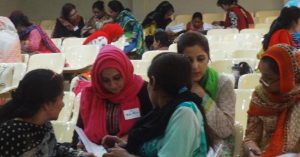 plans against a given criteria. During the ’Observation and Assessment’ session, the teachers were introduced to different observation methods and the concept of subjectivity versus objectivity. They also practiced writing anecdotes. All participants found the workshop very effective and felt that it would significantly help them to conduct age appropriate activities in order to facilitate children’s learning and development.
plans against a given criteria. During the ’Observation and Assessment’ session, the teachers were introduced to different observation methods and the concept of subjectivity versus objectivity. They also practiced writing anecdotes. All participants found the workshop very effective and felt that it would significantly help them to conduct age appropriate activities in order to facilitate children’s learning and development.
ECEDP-News
The class of 2015 graduates
The 10th batch of the programme graduated this year. The ceremony was held on 26th August, 2016 at TRC and was attended by the graduates and their families.
Director, TRC, Ambreena Ahmed, welcomed the guests and spoke about the programme and TRC’s journey. She also shared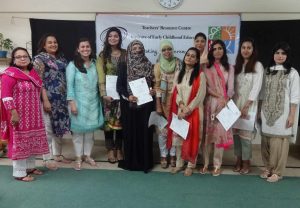 plans of acquiring international accreditation for the course as well as the possibility of offering a full-fledged degree in ECE from TRC’s platform. She announced recommencement of the course in Urdu after a gap of five years.
plans of acquiring international accreditation for the course as well as the possibility of offering a full-fledged degree in ECE from TRC’s platform. She announced recommencement of the course in Urdu after a gap of five years.
Noshin Khan who is heading the programme presented details of the coursework and highlights of the 10th year.
Ms. Azra Raza, Chairperson, TRC, Governing Body, was the guest of honour. Ms. Azra congratulated TRC and the graduates and gave away certificates to the outgoing class.
TRC Offers ECE-DP Urdu
TRC has always been committed to improving teachers’ capacity in the public sector. With the National ECE Curriculum to its credit as a landmark contribution to ECE strengthening in Pakistan, TRC has trained and continues to train government teachers, school heads and education managers to impact early years’ learning environments in schools.
TRC is proud to have on board atleast 17 teachers from the public sector this year enrolled in the programme. This was made possible through the financial support of corporate sector organisations and individuals. The TRC team relentlessly worked hard to mobilise resources for enabling government teachers to benefit from the programme.
Course orientations for public and private sector teachers
The pre-session orientation for the private sector teachers was held on 6th September 2016 at TRC. The new 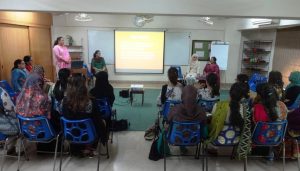 students were introduced to the faculty, programme team and TRC management. Through interactive presentations and discussions, the new batch was made aware of what to expect during their year long association with TRC.
students were introduced to the faculty, programme team and TRC management. Through interactive presentations and discussions, the new batch was made aware of what to expect during their year long association with TRC.
A separate orientation session for the selected public sector teachers and their Taaluka Education Officers (TEOs) was held on September 7, 2016 at TRC where the selected participants and their TEOs signed a ‘Consent Form’. In that session the participants were informed about the programme courses and policies and were introduced to the 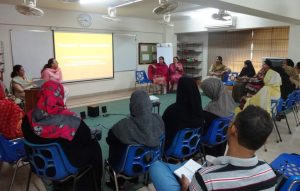 faculty and management. The teachers and TEOs had many queries regarding course content and assessment procedures which were responded to by the programme team. Both the TEOs and teachers applauded TRC’s efforts for capacity development of government teachers and pledged commitment to make the most of this opportunity.
faculty and management. The teachers and TEOs had many queries regarding course content and assessment procedures which were responded to by the programme team. Both the TEOs and teachers applauded TRC’s efforts for capacity development of government teachers and pledged commitment to make the most of this opportunity.
The 11th batch arrives!
On 19th September 2016, TRC opened it’s doors for 34 new teachers to embark on the yearlong professional development journey with us. The first term began for both the English and Urdu cohorts with new hopes, excitement and much to look forward to.

